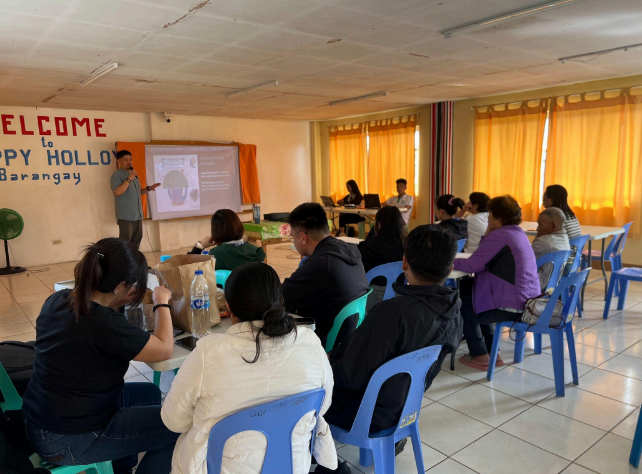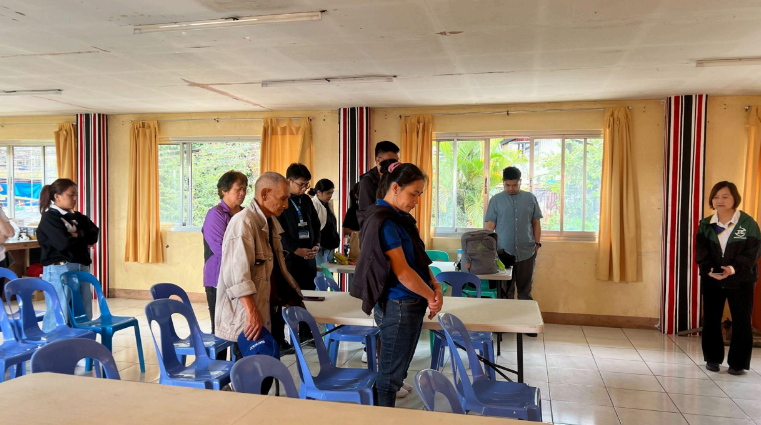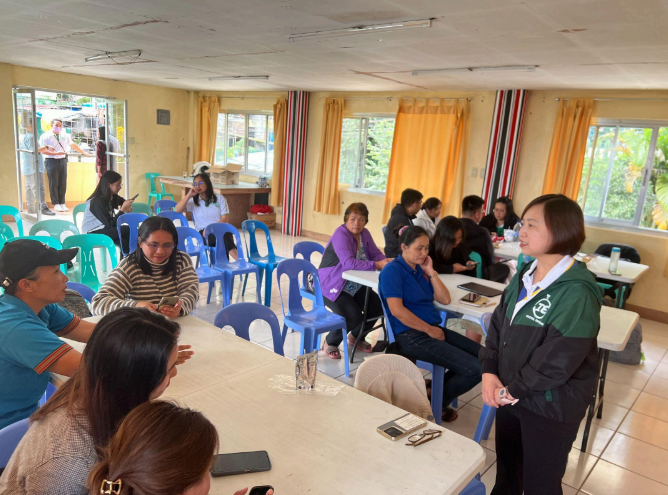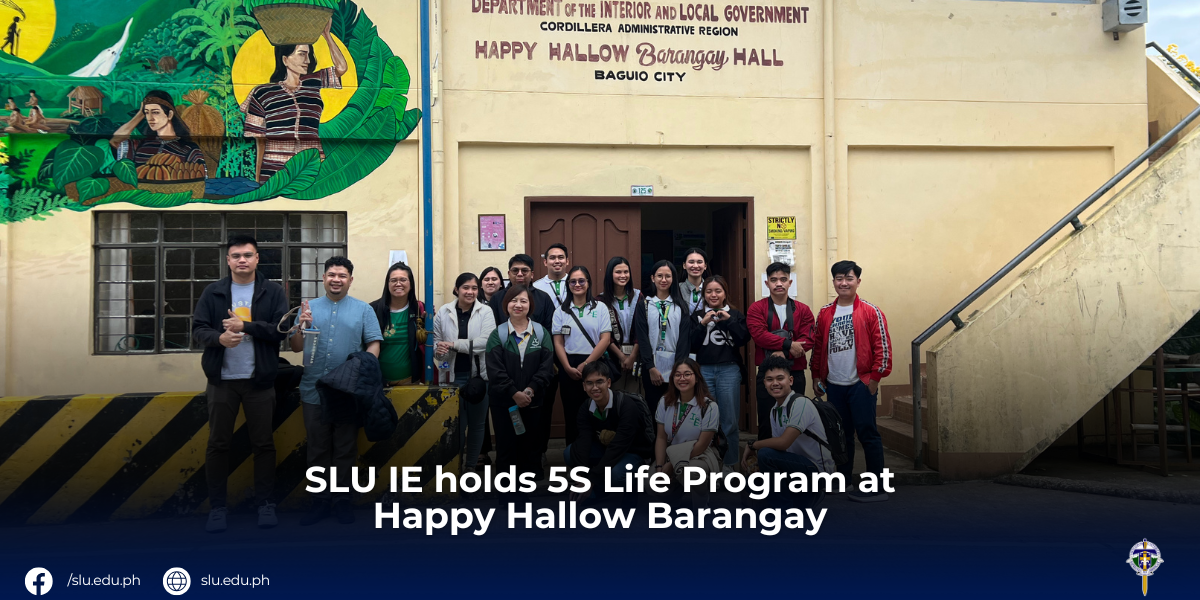In a dedicated effort to promote efficient governance, community engagement, and sustainable development, the Industrial Engineering Department of Saint Louis University (SLU) joined hands with various partners for an outreach program at Barangay Happy Hallow, Baguio City. This initiative, held on 5 November 2024 at the Barangay Hall, was spearheaded by the SLU Industrial Engineering faculty and the Philippine Institute of Industrial Engineers (PIIE) – SLU Student Chapter in collaboration with American Corner Baguio, the Department of Science and Technology – CAR City Government of Baguio.
The program is a concrete manifestation of SLU’s commitment to supporting the UN’s SDG 4: Quality Education and SDG 17: Partnerships for the Goals, as well as the CICM advocacies for justice, peace, and indigenous people’s advocacy. By focusing on education, collaboration, and community development, this project empowered barangay officials and enhanced local governance, contributing to a sustainable future.
Supporting Sustainable Development Goals (SDG 4 and SDG 17)
This outreach program aligns with the United Nations Sustainable Development Goals, particularly SDG 4: Quality Education and SDG 17: Partnerships for the Goals. The project served as an educational platform, equipping barangay officials with practical knowledge of the 5S methodology—a globally recognized system for workplace organization. This supports SDG 4 by extending quality education beyond the classroom and into the community, allowing local officials to apply efficient work habits in real-world settings.
The program also embodies SDG 17 by highlighting the power of partnerships. It was a collaborative effort that brought together SLU, local government, and non-governmental organizations (NGOs), demonstrating how academic institutions, local agencies, and partners can work hand-in-hand to achieve sustainable development. This multi-stakeholder approach amplifies the program’s impact, ensuring that the benefits are not only short-lived but have lasting effects on local governance.


Embracing CICM Advocacies: Justice, Peace, and Indigenous Peoples’ Rights
The outreach initiative also supports CICM (Congregation of the Immaculate Heart of Mary) advocacies, focusing on justice, peace, and indigenous peoples’ rights. Barangay Happy Hallow is home to a diverse population, including indigenous communities. By enhancing the barangay’s organizational efficiency, the project contributes to better governance, fostering a more equitable and peaceful environment. This is in line with the CICM’s call for justice and peace, as an efficient barangay hall enables officials to better serve the community, particularly its indigenous members, thus promoting their welfare and rights.


Objective and Scope
The primary goal of this outreach was to implement the second phase of the 5S methodology, focusing on the “Set in Order” principle. The program aimed to:
1. Present findings from a pre-assessment of the existing layout and functionalities of the Barangay Hall.
2. Provide a hands-on orientation on organizing and designating tools and materials.
3. Propose and discuss optimized layouts to enhance the effective use of space within the barangay hall.
Significance of the Initiative
Barangay Happy Hallow, a crucial governance unit in Baguio City, faces challenges with workspace efficiency due to limited infrastructure and ineffective organizational systems. This outreach aimed to address these concerns by continuing the 5S methodology, which SLU began implementing in September 2024. The second phase emphasized organizing the barangay hall to foster a more productive working environment. The methodology’s ultimate goal is to create a more functional, accessible, and efficient workspace for barangay officials, directly impacting the quality of services they provide to the local community.
Program Highlights
The outreach program began at 9:00 AM with an opening prayer and a welcome address. Led by Engr. Geraldine G. Nerona, the program provided an overview of the pre-assessment results related to the barangay facilities’ layout and space functionality. This set the stage for a training session led by Engr. Anthony James Domingo, who introduced the “Set in Order” principles to barangay officials.
Post-orientation, the SLU student extensionists presented proposed layouts for various sections of the barangay facilities, including the Learning Area, Meeting Room, Captain’s Office, Kitchen, Clinic, and Daycare Center. A robust discussion followed, with participants sharing feedback and suggestions for each layout proposal. This collaborative session aimed to ensure that the proposed changes met the unique needs of the barangay.
Collaboration and Support
The outreach program was a true embodiment of collaborative community development. In addition to the student extensionists and faculty members, key support came from partner organizations such as American Corner Baguio and DOST-CAR, reflecting a united effort to address local challenges. A modest budget, funded by SLU and its Industrial Engineering Department, was allocated for food and transportation, ensuring all participants were adequately supported.
Impact and Feedback
The program concluded with closing remarks from Engr. Patrick Franz Pascua on behalf of the IE faculty. Hon. Julia C. Dangpa, one of the barangay officials, expressed her gratitude for the initiative, highlighting how the proposed changes would foster better organizational habits and service delivery. The session ended with a prayer led by the Industrial Engineering Department Head, Engr. Michelle Adiwang, and a group photo capturing the spirit of cooperation and learning.

Conclusion
The 5S outreach initiative at Barangay Happy Hallow is more than a community project; it is a platform for education, transformation, and sustainable practices. By engaging in real-world applications, Industrial Engineering students gain valuable experience, reinforcing their commitment to making a tangible difference in society. This outreach not only equips barangay officials with essential organizational skills, but also fosters a culture of continuous improvement and collaboration—values that are key to achieving long-term sustainability.
Through projects like this, SLU’s Industrial Engineering Department continues to exemplify how academic institutions can extend their reach beyond the classroom, making meaningful contributions to local governance and community well-being. The commitment to SDGs and CICM advocacies underscores the program’s holistic approach, highlighting the importance of quality education, partnership, justice, and respect for indigenous peoples. (Article by PIIE-SLU SC)







